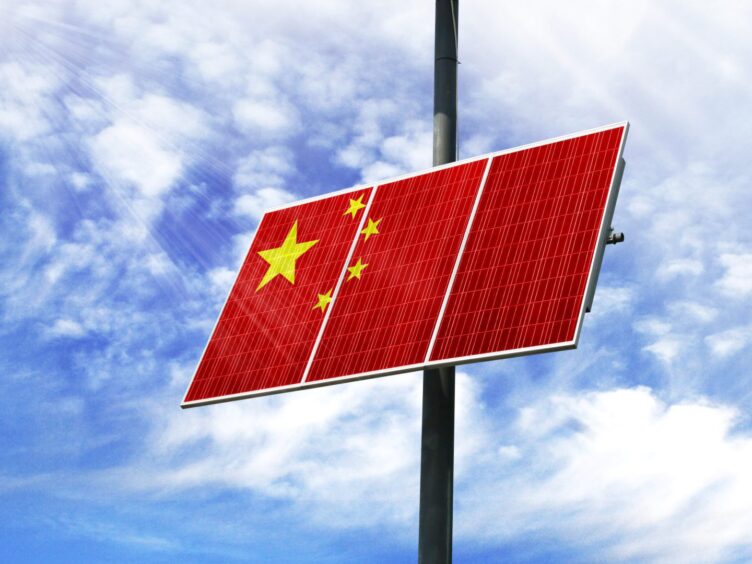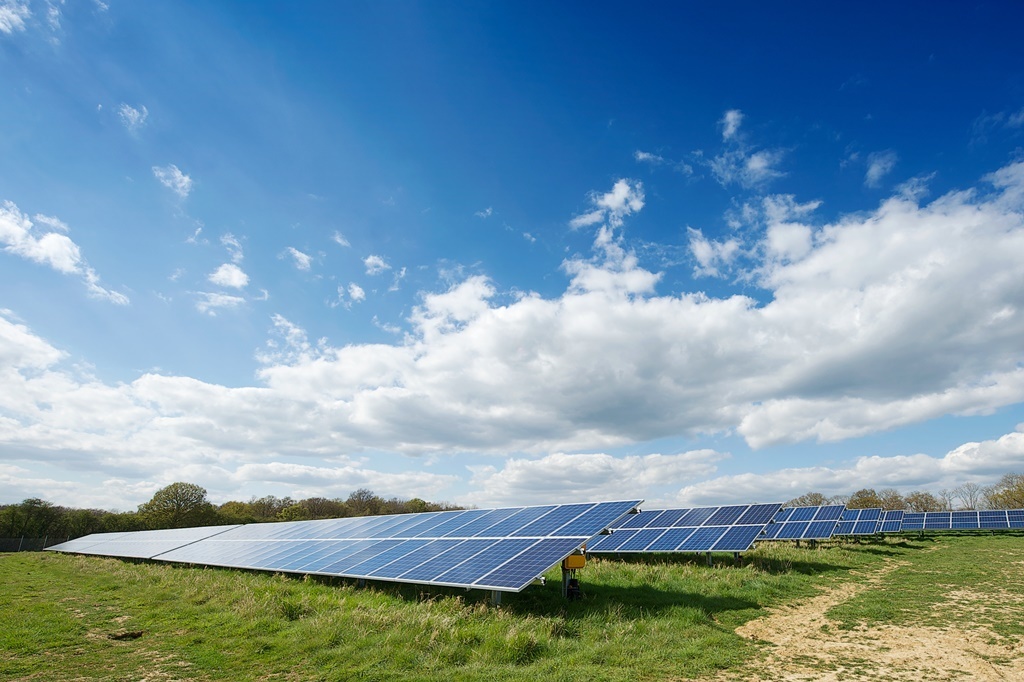 © Supplied by Shutterstock
© Supplied by Shutterstock It was totally predictable. On March 26, Labour got away with it, voting to block a House of Lords attempt to prevent the Starmer Administration buying solar panels where there is “credible evidence” of modern slavery in the supply process, especially China.
And the prime architect of the vote success? One presumes it was energy secretary Ed Miliband by his working behind the scenes to ensure that a three-line whip on voting Labour MPs was in place.
Miliband wants the import floodgates opened wide to hundreds of megawatts worth of Chinese-made solar panels.
There is to be a massive programme of equipping schools, hospitals and other public buildings the length and breadth of the British Isles and China is the world’s largest manufacturer.
It is well known that the Chinese utilise slave labour in PV materials extraction, refining and panel manufacturing.
However, to endorse this by chucking out a critical Lords Amendment to the Great British Energy Bill is surely one of the most low-down manoeuvres to have been perpetrated in the House of Commons in decades.
It amounts to a virtual endorsement of modern slavery by Britain, though of course Labour purred during the Tuesday afternoon debate on the Lords Amendments to the Great British Energy Bill, notably No.2.
Seeking to justify Labour’s position, energy security and net zero secretary Michael Shanks said Lords Amendment 2 would “prevent the Secretary of State from providing financial assistance to Great British Energy if credible evidence of modern slavery was found in its supply chains”.
In any case, he claimed that the China slavery issue was adequately taken care of under existing legislation, namely the Procurement Act 2023 (implemented on February 24 this year) and Modern Slavery Act 2015.
Shanks further claimed: “Great British Energy has a range of tools to tackle modern slavery in its supply chains. GBE will prepare a slavery and human trafficking statement when it meets the thresholds set out under section 54 of the Modern Slavery Act 2015. That will outline the steps it is taking to ensure that slavery and human trafficking are not present in its supply chains or any part of its business.
“Under the Procurement Act 2023, GBE can reject bids and terminate contracts with suppliers that are known to use forced labour themselves or that have it anywhere in their supply chain. I commit here that GBE will utilise the debarment list to ensure that suppliers with unethical supply chains cannot participate in procurement or be awarded contracts by GBE.”
Tory grandee, Sir Iain Duncan Smith, waded in, warning Shanks that he was being economical with the truth.
Smith stated: “The minister will know full well that the Procurement Act can only be enacted once a supplier has had a conviction under section 54 of the Modern Slavery Act.
“To do that, proceedings have to be able to be taken against the company that is involved in the slavery. A British company involved in agency is not involved in the slavery.
“It would have to get the Chinese Government to prosecute the Chinese company to make sure that they got a prosecution here. That is never going to happen.”
He went on to say: “I was one of those who brought the Modern Slavery Act into being 10 years ago, but at that time we did not understand how bad the situation was in China.
“Over 90% of polysilicon is made in China, and we know for a fact that 97% of all the solar arrays being sold here contain polysilicon from Xinjiang, which will have been made by slave labour. There is no dispute at all about that.”
Both failed to mention that the Procurement Act has only just come into force and so lacks a track record for efficacy.
And so, the debate ground on. I watched grimly as a small number of Labour and opposition MPs batted to and fro, trading claim and counter-claim, facts and hearsay.
The growing anger in the chamber was palpable, even on TV and despite the sparsely populated benches.
Sadly, slavery – recast as modern slavery – is a very real issue in the world today and China especially stands accused as one of its epicentres.
So, it seemed inevitable that comparison of the China slavery situation to the holocaust of World War II would come up in the Great British Energy amendment debate, especially as its 80th anniversary had been marked internationally just a few weeks ago.
And it did. It was Josh Babarinde, Liberal Democrat MP for Eastbourne, who raised the subject.
“My constituent Dorit Oliver-Wolff is a Holocaust survivor. She knows what slave labour looks like, and she has written to the Prime Minister to urge that our energy transition does not repeat so many of the atrocities that she has seen,” he said.
“She is awaiting a reply from the Prime Minister. Will the minister nudge No.10 to ensure that she gets the response that she needs and deserves on her own behalf and that of victims of modern slavery across the world?”
Shanks acknowledged, admitting: “I saw that powerful letter, which was widely reported in the press.”
He continued: “The wider point raised is absolutely right. I recognise the need not just in the energy sector but across our economy to ensure that we remove any risk of forced labour in supply chains.
“I am determined that Great British Energy will be a leader in the sector on doing that, particularly within the energy space.”
But its surely deeper than that.
China stands accused by an apparently large slice of the global community of committing genocide against one of its minority peoples, in particular the Uyghur.
They make up much of the forced labour that the Beijing government utilises in the exotic minerals extraction and wider supply chain of its photovoltaics industry.
What many people don’t realise is the word genocide did not exist prior to 1944.
According to the Holocaust Museum: “The word ‘genocide’ was created by the Polish-Jewish lawyer, Raphael Lemkin. He coined it to help describe early 20th century attempts to destroy entire nations and ethnic groups, including the Holocaust.”
There is a significant amount of material regarding the Uyghur issue produced by organisations such as Amnesty International and the Human Rights Foundation, plus authoritative journalism generated by news media like CNN.
And then there’s the rather useful Unison Trade Union report ‘Clean-Dirty Energy – Sourcing solar energy without Uyghur forced labour’.
Unison worked with the NGO Stop Uyghur Genocide and the Helena Kennedy Centre for International Justice at Sheffield Hallam to provide a guide on identifying and therefore avoiding Uyghur forced labour in solar supply chains.
It is designed to help governments (especially local) and other public bodies make better purchasing decisions and streamline their solar supplier vetting process.
Unison warns: “Finding alternative suppliers is both a humanitarian and an environmental priority. China is the planet’s biggest polluter, and the Uyghur region is the government’s national hub for oil, gas and coal.
“Not only is forced labour rife but lax national environmental standards allow companies to drill into the Uyghur people’s natural resources and fuel their factories with cheap coal.”
I rather think at least some of the MPs present at the Lords Amendment debate are familiar with the report, which was published in August 2022. But one suspects that most won’t be, and understandably so given the breadth of their workloads.
That so few took part in the debate and yet so many voted down the Lords Amendment, the Ayes had it with 314 votes; the Noes secured 198 votes, seems mostly to speak of ignorance, arrogance and stupidity.
It was obviously an easy win for Labour, well it was always going to be.
Miliband probably didn’t have to push for the whip despite heavy dissent within Labour’s ranks having perhaps rattled him.
As for Great British Energy and the multiple skills that Shanks in the debate claimed it had, the company was incorporated barely six months ago.
It has an interim CEO, a board and a few people on the payroll. And I don’t think the Aberdeen HQ has been nailed down quite yet either.
Therefore, it seems that GBE is, in reality, hardly prepared at all for anything right now.
Indeed, we as a country appear ill-prepared and are venturing down a very dangerous road by knowingly courting slavery of the China variety or indeed any other manifestation, in my opinion.
It is therefore crucial that the UK government and especially parliamentary ministers/secretaries like Miliband really do make the right call.
On this occasion I believe they have failed.

